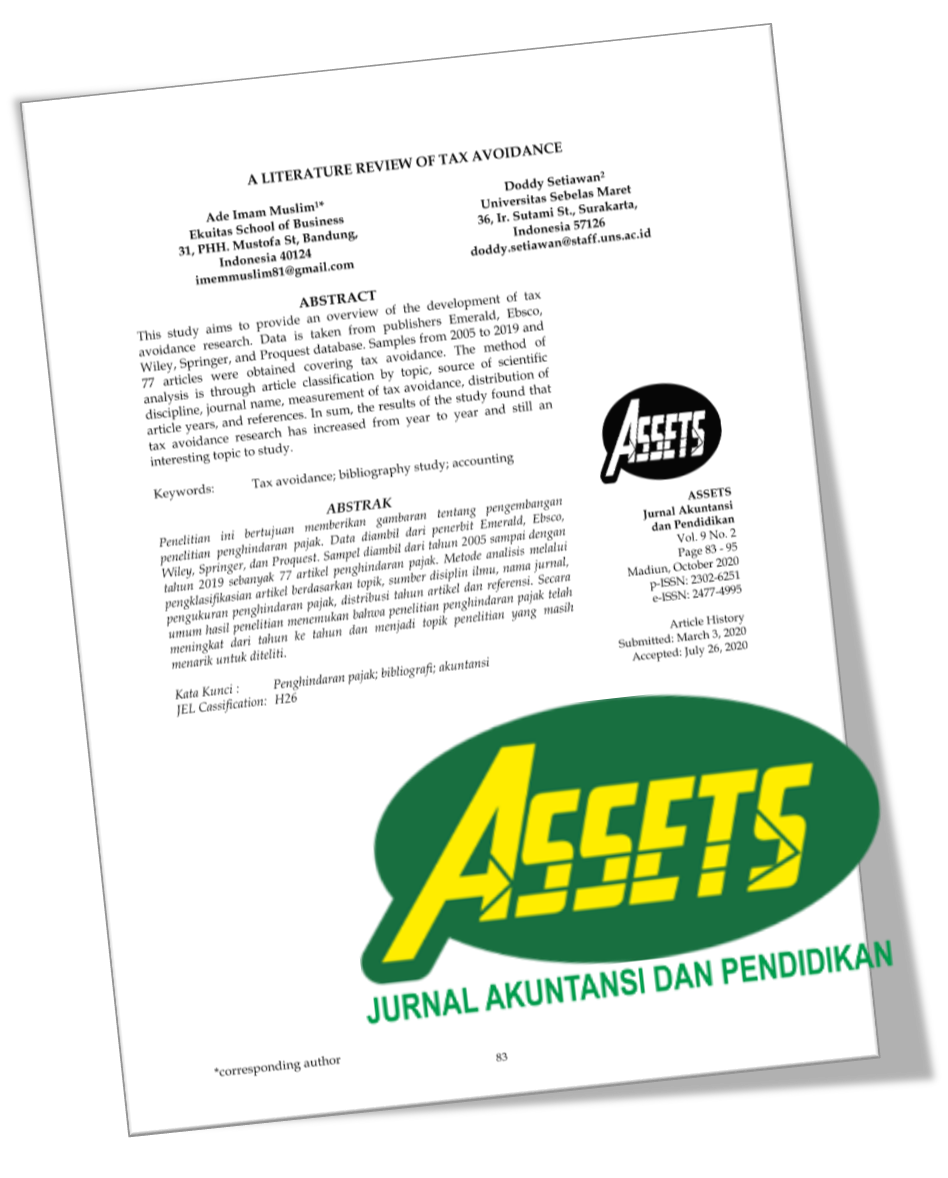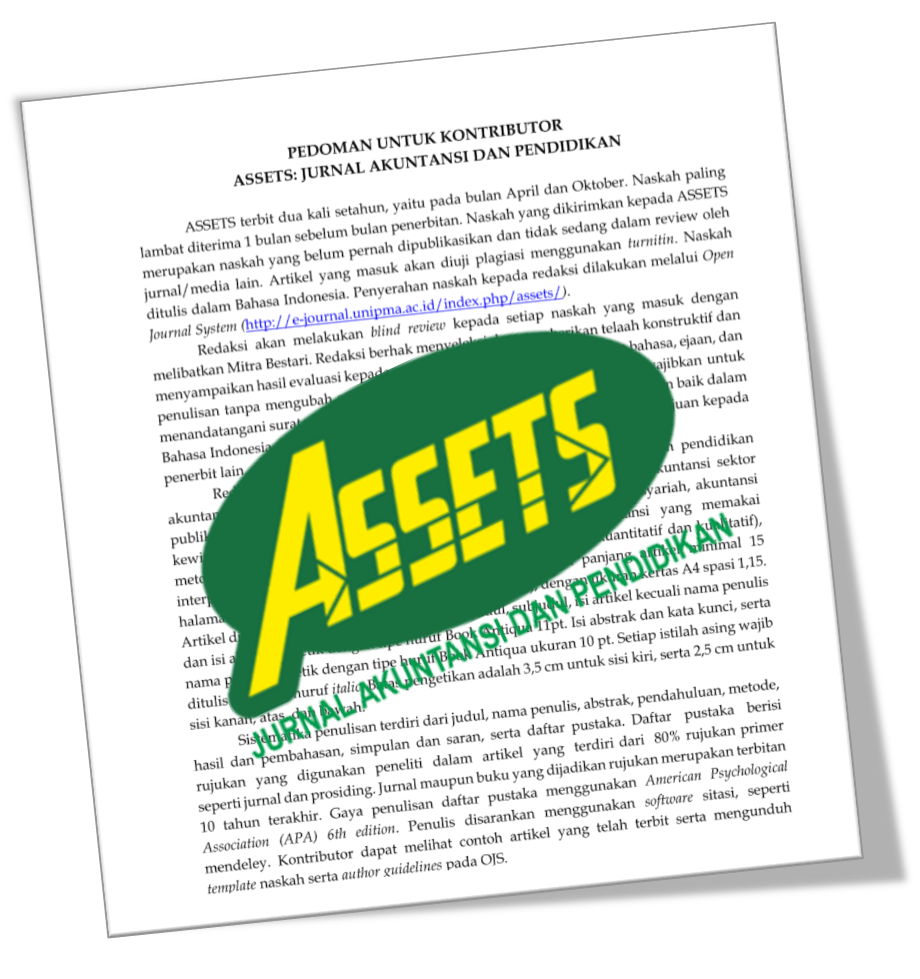DOES ENTREPRENEURIAL KNOWLEDGE MATTER FOR EDUPRENEURSHIP BEHAVIOR IN TEACHER TRAINING STUDENTS?
DOI:
https://doi.org/10.25273/jap.v12i2.17939Keywords:
Attitude, Social Support, Self-efficacy, Entrepreneurial Knowledge, Edupreneurship Behavior, Sikap, Dukungan Sosial, Efikasi Diri, Pengetahuan Kewirausahaan, Perilaku EdupreneurshipAbstract
ABSTRACT
This study aims to analyze the construct of the edupreneurship model for teacher training students. Questionnaires were given to students enrolled in the teacher training program at the Faculty of Economics, Universitas Negeri Medan, with a sampling of 275 respondents and an analytical tool for testing the relationship between variables using PLS-SEM. The empirical results found that attitude towards entrepreneurial knowledge proved to have no positive and significant effect; social support for entrepreneurial knowledge is proven to have a positive and significant impact; Self-efficacy on entrepreneurial knowledge is proven to have a positive and significant impact; entrepreneurial knowledge on edupreneurship behavior is proven to have a positive and significant effect.
ABSTRAK
Penelitian ini bertujuan untuk menganalisis konstruk model edupreneurship pada mahasiswa keguruan. Kuesioner diberikan kepada mahasiswa program keguruan Fakultas Ekonomi di Universitas Negeri Medan dengan total sampel sebanyak 275 responden dan alat analisis untuk menguji hubungan antar variabel menggunakan PLS-SEM. Hasil empiris menemukan bahwa sikap terhadap pengetahuan kewirausahaan terbukti tidak berpengaruh positif dan signifikan; dukungan sosial terhadap pengetahuan kewirausahaan terbukti berpengaruh positif dan signifikan; Efikasi diri terhadap pengetahuan kewirausahaan terbukti berpengaruh positif dan signifikan; Pengetahuan kewirausahaan terhadap perilaku edupreneurship berpengaruh positif dan signifikan.
Downloads
References
Agasisti, T., & Bowers, A. J. (2017). 9. Data analytics and decision making in education: Towards the educational data Scientist as a key actor in schools and higher education institutions. Handbook of contemporary education economics, p. 184.
Agrawal, R. (2013). How to identify and Select a Business Opportunity and Then Implement the Business Idea? A Case on Edupreneurship in India. Journal of Business Studies Quarterly, 4(4), 176. https://www.researchgate.net/profile/Reena-Agrawal/publication/342392857_How_to_Identify_and_Select_a_Business_Opportunity_and_Then_Implement_the_Business_Idea_A_Case_on_Edupreneurship_in_India/links/5ef21d5e299bf1c5c8dbb5c3/How-to-Identify-and-Select-a-Business-Opportunity-and-Then-Implement-the-Business-Idea-A-Case-on-Edupreneurship-in-India.pdf
Ahmad, S. Z., Bakar, A. R. A., & Ahmad, N. (2018). An evaluation of teaching methods of entrepreneurship in hospitality and tourism programs. The International Journal of Management Education, 16(1), 14–25. https://doi.org/10.1016/j.ijme.2017.11.002
Ahmad, S. Z., & Buchanan, R. F. (2015). Entrepreneurship education in Malaysian universities. Tertiary Education and Management, 21(4), 349–366. https://doi.org/10.1080/13583883.2015.1106577
Ajzen, I. (1991). The theory of planned behavior. Organizational Behavior and Human Decision Processes, 50(2), 179–211. https://doi.org/10.1016/0749-5978(91)90020-T
Alim, I. (2010). Peranan ITB dalam Pengembangan Kewirausahaan. Bandung: Institut Teknologi Bandung.
Anand, S., John, A., Mamidi, R., & Lenka, R. (2022). Lessons from a Women-led Livelihood Pilot in a Neglected Tropical Diseases endemic area in Southern India. Disability, CBR & Inclusive Development, 33(1), 140-146. https://doi.org/10.47985/dcidj.527
Apunyo, R., White, H., Otike, C., Katairo, T., Puerto, S., Gardiner, D., Kinengyere, A. A., Eyers, J., Saran, A., & Obuku, E. A. (2022). Interventions to increase youth employment: An evidence and gap map. Campbell Systematic Reviews, 18(1), e1216. https://doi.org/10.1002/cl2.1216
Barba-Sánchez, V., & Atienza-Sahuquillo, C. (2018). Entrepreneurial intention among engineering students: The role of entrepreneurship education. European Research on Management and Business Economics, 24(1), 53-61. https://doi.org/10.1016/j.iedeen.2017.04.001
Bygrave, W. D., & Hofer, C. W. (1992). Theorizing about entrepreneurship. Entrepreneurship Theory and Practice, 16(2), 13–22. https://doi.org/10.1177/104225879201600203
Chia, A., Ong, J., Bundele, A., & Lim, Y. W. (2022). Social entrepreneurship in obesity prevention: A scoping review. Obesity Reviews, 23(3), e13378. https://doi.org/10.1111/obr.13378
Creswell, J. W. (2014). Research design: Quantitative, qualitative and mixed methods (4th ed.). Thousand Oaks, CA: Sage.
Dinc, M. S., & Budic, S. (2016). The impact of personal attitude, subjective norm, and perceived behavioral control on entrepreneurial intentions of women. Eurasian Journal of Business and Economics, 9(17), 23–35. https://doi.org/10.17015/ejbe.2016.017.02
DrnovÅ¡ek, M., Wincent, J., & Cardon, M. S. (2010). Entrepreneurial selfâ€efficacy and business startâ€up: developing a multiâ€dimensional definition. International Journal of Entrepreneurial Behavior & Research. 16(4), 329-348. https://doi.org/10.1108/13552551011054516
Fayolle, A., & Gailly, B. (2015). The impact of entrepreneurship education on entrepreneurial attitudes and intention: Hysteresis and persistence. Journal of Small Business Management, 53(1), 75-93. https://doi.org/10.1111/jsbm.12065
Hair, J., Anderson, R., Babin, B., & Black, W. (2010). Multivariate Data Analysis.pdf. In Australia : Cengage: Vol. 8 edition (p. 758).
Jena, R.K. (2020). Measuring the impact of business management Student’s attitude towards entrepreneurship education on entrepreneurial intention: A case study. Computers in Human Behavior, p. 107, 106275. https://doi.org/10.1016/j.chb.2020.106275
Karyaningsih, R. P. D. (2020). Does entrepreneurial knowledge influence vocational students’ intention? Lessons from Indonesia. Entrepreneurial Business and Economics Review, 8(4), 138–155. https://www.ceeol.com/search/article-detail?id=975924
Klyver, K., Honig, B., & Steffens, P. (2018). Social support timing and persistence in nascent entrepreneurship: exploring when instrumental and emotional support is most effective. Small Business Economics, 51(3), 709–734. https://doi.org/10.1007/s11187-017-9964-5
Krueger Jr, N. F., & Brazeal, D. V. (1994). Entrepreneurial potential and potential entrepreneurs. Entrepreneurship Theory and Practice, 18(3), 91–104. https://doi.org/10.1177/104225879401800307
Lăcătuş, M. & Stăiculescu,C.(2016). Entrepreneurship in Education. International conference Knowledge-based Organizational, 22(2) 438–443. https://doi.org/10.1515/kbo-2016-0075
Liñán, F. (2004). Intention-based models of entrepreneurship education. Piccolla Impresa/Small Business, 3(1), 11–35. https://www.researchgate.net/profile/Francisco-Linan/publication/235937886_Intention-Based_Models_of_Entrepreneurship_Education/links/02e7e53b246df9830a000000/Intention-Based-Models-of-Entrepreneurship-Education.pdf
Li, L., & Wu, D. (2019). Entrepreneurial education and students' entrepreneurial intention: Does team cooperation matter? Journal of Global Entrepreneurship Research, 9(1), 35. https://doi.org/10.1186/s40497-019-0157-3
Maydiantoro, A., Ridwan, R., Tusianah, R., Rachman, A., Kesuma, P., Isnainy, U., & Zainaro, M. A. (2021). Entrepreneurship in Higher Education Curricula: Evidence from Indonesia. Psychology and Education, 58(3), 936–949. http://psychologyandeducation.net/pae/index.php/pae/article/view/3027
Mila, H. (2013). Pendidikan kewirausahaan: Sebuah alternatif mengurangi pengangguran terdidik dan pencegahan korupsi. Al-Ta Lim Journal, 20(3), 465–471. https://doi.org/10.15548/jt.v20i3.44
Muthmainnah, M., Al Yakin, A., Massyat, M., Lulaj, E. and Bayram, G.E. (2022). Developing Students' Life Skills through Edupreneurship in the Digital Era, Grima, S., Özen, E. and Boz, H. (Ed.) The New Digital Era: Digitalisation, Emerging Risks, and Opportunities (Contemporary Studies in Economic and Financial Analysis, Vol. 109A), Emerald Publishing Limited, Bingley, pp. 169-190. https://doi.org/10.1108/S1569-37592022000109A011
Neto, R. do C. A., Rodrigues, V. P., Stewart, D., Xiao, A., & Snyder, J. (2018). The influence of self-efficacy on entrepreneurial behavior among K-12 teachers. Teaching and Teacher Education, pp. 72, 44–53. https://doi.org/10.1016/j.tate.2018.02.012
Nielsen, M. S. (2020). Passing on the good vibes: Entrepreneurs’ social support. The International Journal of Entrepreneurship and Innovation, 21(1), 60–71. https://doi.org/10.1177/1465750319842530
Romano, L., Buonomo, I., Callea, A., Fiorilli, C., & Schenke, K. (2020). Teacher Emotional Support Scale on Italian High School Students: A Contribution to the Validation. The Open Psychology Journal, 13(1). https://doi.org/10.2174/1874350102013010123
Roxas, B. (2014). Effects of entrepreneurial knowledge on entrepreneurial intentions: a longitudinal study of selected South-east Asian business students. Journal of Education and Work, 27(4), 432–453. https://doi.org/10.1080/13639080.2012.760191
Shapero, A., & Sokol, L. (1982). The social dimensions of entrepreneurship. University of Illinois at Urbana-Champaign’s Academy for Entrepreneurial Leadership Historical Research Reference in Entrepreneurship. https://papers.ssrn.com/sol3/papers.cfm?abstract_id=1497759
Simonson, M., Zvacek, S. M., & Smaldino, S. (2019). Teaching and learning at a distance: Foundations of distance education 7th edition. USA: Information Age Publishing, Inc.
Storey, D. J. (2016). Understanding the small business sector. Routledge.
Suhendro, E. (2022). Edupreneurship in Modern Era: A Lesson for Early Childhood Studies. Golden Age: Jurnal Ilmiah Tumbuh Kembang Anak Usia Dini, 7(3), 121–132. https://doi.org/10.14421/jga.2022.73-02
Tshikovhi, N., & Shambare, R. (2015). Entrepreneurial knowledge, personal attitudes, and entrepreneurship intentions among South African Enactus students. Problems and Perspectives in Management, 13, Iss. 1 (cont.), 152–158. https://www.businessperspectives.org/author/ndivhuho-tshikovhi
Watson, K. (2019). Stimulating Entrepreneurial Behaviour Through Start-up Competitions: Current Features of Provision in UK Higher Education Institutions. In: McAdam, M., Cunningham, J.A. (eds) Entrepreneurial Behaviour. Palgrave Macmillan, Cham. https://doi.org/10.1007/978-3-030-04402-2_6
Wiratno, S. (2012). Pelaksanaan pendidikan kewirausahaan di pendidikan tinggi. Jurnal Pendidikan dan Kebudayaan, 18(4), 454–466. https://doi.org/10.24832/jpnk.v18i4.101
Zimet, G. D., Dahlem, N. W., Zimet, S. G., & Farley, G. K. (1988). The multidimensional scale of perceived social support. Journal of Personality Assessment, 52(1), 30–41. https://doi.org/10.1207/s15327752jpa5201_2
Zhang, Y., Duysters, G., & Cloodt, M. (2014). The role of Entrepreneurship Education as a predictor of university students' entrepreneurial intention. International Entrepreneurship and Management Journal, 10(3). https://doi.org/10.1007/s11365-012-0246-z
Downloads
Additional Files
Published
Issue
Section
License
Perjanjian Lisensi dan Hak Cipta
Saat mengirimkan naskah ke jurnal, penulis menyatakan bahwa:
- Mereka diberi wewenang oleh rekan penulisnya untuk masuk ke dalam perjanjian ini.
- Karya yang dimaksud belum pernah diterbitkan secara resmi sebelumnya, kecuali dalam bentuk abstrak atau sebagai bagian dari kuliah, resensi, tesis, atau overlay jurnal yang diterbitkan.
- Karya yang dimaksud tidak sedang dipertimbangkan untuk diterbitkan di tempat lain,
- Publikasi karya yang dimaksud telah disetujui oleh semua penulis dan oleh otoritas yang bertanggung jawab - secara tahu sama tahu atau eksplisit - dari lembaga tempat pekerjaan itu dilakukan.
- Mereka mengamankan hak untuk mereproduksi materi apa pun yang telah diterbitkan atau dilindungi hak cipta di tempat lain.
- Mereka menyetujui lisensi dan perjanjian hak cipta berikut.
Hak Cipta
Penulis yang menerbitkan dengan ASSETS: Jurnal Akuntansi dan Pendidikan menyetujui persyaratan berikut:
- Penulis mempertahankan hak cipta dan memberikan jurnal hak publikasi pertama dengan karya yang secara bersamaan dilisensikan di bawah Lisensi Atribusi Creative Commons (CC BY-SA 4.0) yang memungkinkan orang lain untuk berbagi karya dengan pengakuan kepenulisan karya dan publikasi awal di jurnal ini.
- Penulis dapat masuk ke dalam pengaturan kontrak tambahan yang terpisah untuk distribusi non-eksklusif dari versi jurnal yang diterbitkan dari karya tersebut (misalnya, mempostingnya ke repositori institusional atau menerbitkannya dalam sebuah buku), dengan pengakuan publikasi awalnya di jurnal ini.
- Penulis diizinkan dan didorong untuk memposting karya mereka secara daring (misalnya di repositori institusional atau di situs web mereka) sebelum dan selama proses pengiriman, karena dapat menghasilkan pertukaran yang produktif, serta kutipan lebih awal dan lebih besar dari karya yang diterbitkan.
License and Copyright Agreement
In submitting the manuscript to the journal, the authors certify that:
- Their co-authors authorize them to enter into these arrangements.
- The work described has not been formally published before, except as an abstract or part of a published lecture, review, thesis, or overlay journal.
- That it is not under consideration for publication elsewhere,
- That its publication has been approved by all the author(s) and by the responsible authorities – tacitly or explicitly – of the institutes where the work has been carried out.
- They secure the right to reproduce any material already published or copyrighted elsewhere.
- They agree to the following license and copyright agreement.
Copyright
Authors who publish with ASSETS: Jurnal Akuntansi dan Pendidikan agree to the following terms:
- Authors retain copyright and grant the journal right of first publication with the work simultaneously licensed under a Creative Commons Attribution License (CC BY-SA 4.0) that allows others to share the work with an acknowledgment of the work's authorship and initial publication in this journal.
- Authors can enter into separate, additional contractual arrangements for the non-exclusive distribution of the journal's published version of the work (e.g., post it to an institutional repository or publish it in a book), with an acknowledgment of its initial publication in this journal.
- Authors are permitted and encouraged to post their work online (e.g., in institutional repositories or on their website) before and during submission, as it can lead to productive exchanges and earlier and more extraordinary citations of published work.

ASSETS: Jurnal Akuntansi dan Pendidikan is licensed under a Creative Commons Attribution-ShareAlike 4.0 International License.










